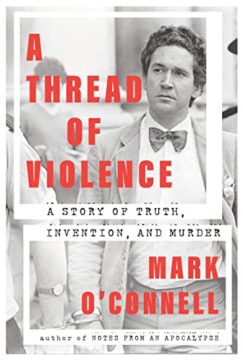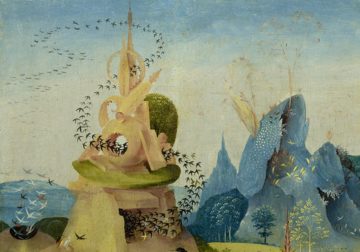Category: Recommended Reading
Jane Birkin (1946 – 2023) Actor And Singer
Catherine Burks-Brooks (1939 – 2023) Civil Rights Activist
Sunday Poem
Odometer
We glance always at this little
window of the slowest slot machine
to calendar our progress out.
The meter not ticking is active
just the same, summing up distance
toward the big question, the rollers
marking off ground and still counting.
We’re happy no matter how far
gone, to be clocking off the miles,
to keep on breaking our own record
of progress, to make the old wreck
go another revolution
of the thousand wheel, and the ten,
as one candy-size roll of our
numbers turns up another ten times
slower until they all turn up,
in the ode to travel, zero
zero zero zero zero
as it was in the beginning.
by Robert Morgan
from The Language They Speak Is Things to Eat
University of North Carolina Press, 1994
Saturday, July 22, 2023
Noninherited Genetic Mutations Link to Schizophrenia
Alejandra Manjarrez in The Scientist:
 Although they are rare, noninherited mutations can have a large impact. According to a new study published in Cell Genomics, somatic mutations occurring during early development of the human embryo may contribute to some cases of schizophrenia.1 Specifically, the authors found recurrent mutations disrupting two genes, one of which previously linked to the disorder.
Although they are rare, noninherited mutations can have a large impact. According to a new study published in Cell Genomics, somatic mutations occurring during early development of the human embryo may contribute to some cases of schizophrenia.1 Specifically, the authors found recurrent mutations disrupting two genes, one of which previously linked to the disorder.
The mutations discovered by the research team are “rare variants that affect a few people but may have a very large effect size,” said Thomas Burne, a neuroscientist at the Queensland Brain Institute who did not participate in this study. Burne noted that this is not going to explain how people develop schizophrenia in general, but it might be important for precision medicine and for prompting future discoveries.
Somatic mutations contribute to other psychiatric disorders such as autism and focal epilepsy.2,3 “It seemed like it was worth exploring whether something similar might be going on in schizophrenia,” said Christopher Walsh, a neurogeneticist at the Boston Children’s Hospital and coauthor of the paper. To test this hypothesis, Walsh and his colleagues analyzed the genomes of blood samples from 12,834 patients diagnosed with schizophrenia and compared them with samples from 11,648 control individuals.
More here.
Barbie dolls dressed in space suits have been helping scientists solve the problem of lunar dust
Grace Tyrrell in BBC:
 Barbie can do it all. In Greta Gerwig’s 2023 film, she appears as a US president, a Nobel Prize winning physicist, a Supreme Court Justice and even a mermaid. The movie reflects the many roles the doll has had over the decades. One of her most famous is as a space explorer. In the 1960s, Astronaut Barbie was transporting children on space adventures even before Nasa’s own astronauts had taken their first steps on the Moon and 13 years before Nasa began accepting female astronauts into their programme.
Barbie can do it all. In Greta Gerwig’s 2023 film, she appears as a US president, a Nobel Prize winning physicist, a Supreme Court Justice and even a mermaid. The movie reflects the many roles the doll has had over the decades. One of her most famous is as a space explorer. In the 1960s, Astronaut Barbie was transporting children on space adventures even before Nasa’s own astronauts had taken their first steps on the Moon and 13 years before Nasa began accepting female astronauts into their programme.
Now Barbie has been helping space exploration for real. In recent experiments, scientists used the dolls to test methods of removing Moon dust from spacesuits. Wearing a tailor-made spacesuit, Barbie was coated in volcanic ash by a team from Washington State University and sprayed with liquid nitrogen. They found this technique is more effective than previous cleaning methods.
Why is lunar dust a problem? Moon dust is “ubiquitous, abrasive and electrically charged”, according to Ian Wells, a graduate researcher at Washington State University, who was speaking to the BBC World Service programme Unexpected Elements. These “annoyingly clingy” microscopic particles statically stick to the spacesuits of astronauts and are difficult to clean off. During the Apollo missions, astronauts were unable to remove the dust using standard brushes, resulting in damage to the seals on their spacesuits.
More here.
Apocalypse Chow
Arun Gupta in Dissent:
I lead food and history tours around New York City. On a recent tour, I was asked a simple question. Why might the same dish—a sandwich, a slice of pizza, a plate of dumplings—cost three or four times more in one restaurant than in another restaurant a block or two away, and the cheaper version tastes much better?
The question came up in Manhattan’s historic Chinatown while a group of us ate pork and chive, chicken and mushroom, and pork and cabbage dumplings. Everyone agreed they were superb. The skins were silky and gently chewy, the fillings juicy, well-seasoned, and packed with aromatics like chives and ginger. And they avoided the three fatal flaws of dumplings: thick and doughy wrappers, torn skins, and opening when boiled, all signs of poor craftsmanship.
The restaurant was bare bones and dingy. One person said, “I would normally never go into a place like this. How can the food be so good in such a dump?”
The spot, Shu Jiao Fu Zhou, a Fujianese joint on Grand Street near Eldridge, sells six dumplings for $3. Not far away, across Houston Street, lots of restaurants serve dumplings. But six dumplings can cost $15, and they won’t be as tasty as what we ate.
The reason for this divergence in price and quality comes down to how migration, labor and immigration laws, supply chains, and culture all interrelate.
More here.
A Feminist Style
Caitlin Doherty in Sidecar:
What is the problem described today by feminism? A decade ago, a generation of women – now in our late twenties and early thirties – claimed it as a primary political identity, but no longer. Among young radicals in the Anglophone world, embarrassment at our proximity to something so easily co-opted by liberalism and neoliberalism alike issued in two concurrent desertions of the resurgent ‘women’s movement’ of the 2010s: one group jumped ship for an activist project motivated by the critique of capitalism, with which feminism quasi-geometrically ‘intersected’, the other went overboard for a distilled ironic nihilism. In both cases, podcasts ensued.
Where an identifiable form of feminism has clung on most tenaciously is in the commissioning and branding of cultural products. When it comes to the packaging of films and books by, about, or ‘for’ women, marketers’ lexicons have shrunk to two words: ‘timely’ and ‘urgent’. Feminism, in this register, designates any text or tale in which a woman might occupy a central position, or any project in which a role historically occupied by a man has been taken by a woman. Retellings of 1984 from Julia’s perspective, histories of art that apophatically emphasise the centrality of men in the field, films with titles that, taken together, sound like the garbled punchline of a mother-in-law joke: She Said, Don’t Worry Darling, Women Talking.
More here.
A Thread of Violence
Ronan McDonald at The Guardian:
 Grotesque. Unbelievable. Bizarre. Unprecedented. The then Irish prime minister Charles Haughey famously used these four words at a press conference in the summer of 1982, when a double murderer, the subject of a high profile nationwide search, was found to be staying as a guest in the seaside penthouse of the attorney general, Patrick Connolly. The most wanted criminal in Ireland was occasionally chauffeured around in the state car provided to the Irish government’s chief legal adviser, complete with a garda driver.
Grotesque. Unbelievable. Bizarre. Unprecedented. The then Irish prime minister Charles Haughey famously used these four words at a press conference in the summer of 1982, when a double murderer, the subject of a high profile nationwide search, was found to be staying as a guest in the seaside penthouse of the attorney general, Patrick Connolly. The most wanted criminal in Ireland was occasionally chauffeured around in the state car provided to the Irish government’s chief legal adviser, complete with a garda driver.
It was Conor Cruise O’Brien who shortened this into the acronym that was to define an era: Gubu. The ensuing scandal cost Connolly his job and contributed to the fall of the Haughey government later that year. Picking up Mark O’Connell’s remarkable new book about these murders, I was half expecting social analysis, and perhaps some theoretical reflections on 1980s Ireland, such as Fintan O’Toole offers when dissecting the case in his recent autobiographical social history, We Don’t Know Ourselves.
more here.
The Myth of Underdevelopment
 Sehar Iqbal in Phenomenal World:
Sehar Iqbal in Phenomenal World:
On August 5, 2019, Indian Home Minister Amit Shah presented the draft of the Jammu and Kashmir (J&K) Reorganization Bill in the Lok Sabha, the lower house of India’s parliament. The bill threatened to permanently alter the legal, political, and economic status of the state, sparking widespread outrage in the region and across the world. As Yamini Aiyar of the Hindustan Times commented:
The undemocratic manner in which the J&K reorganization bill was passed in Parliament, the silencing of voices of those affected by these actions, and the unprecedented move to convert a recognised state into a Union Territory (UT) —mark a rupture in India’s federal trajectory. India is now firmly on the path to centralisation of power and may well be inching toward transforming into a unitary rather than federal state.1
The bill proposed revoking the state’s constitutional autonomy, downgrading it to an Indian Union territory directly administered by the Indian government, and opening its international legal status to dispute. Most importantly, it abrogated Article 370 of the Indian Constitution, which in 1949 gave Jammu and Kashmir “special status,” including measures of autonomy from the Indian union government and the ability to grant special employment and land ownership privileges to permanent residents.
The right-wing ruling Bharatiya Janata Party (BJP) used its majority to force through the bill in both houses of Parliament. On August 6, a day following the bill’s presentation, Article 370 was repealed by Presidential order. The move was widely considered illegal by constitutional experts and the Indian Supreme Court and lacked support from J&K’s elected state government—a coalition led by the local People’s Democratic Party—which itself was dismissed by Presidential decree in June 2019. Preempting resistance in what has been the site of continuous armed insurgency against Indian rule since 1988, Shah added 35,000 armed forces to the existing 308,000 stationed in J&K.
More here.
The Art Thief
But while the book is, as the subtitle says, a story of crime, it’s also, on a quieter level, an exploration of archiving and ownership. At the height of his infamy, Breitwieser viewed himself as an “art liberator.”
more here.
Michael Finkel on The Art Thief
Saturday Poem
Stationery
The moon did not become the sun.
It just fell on the desert
in great sheets, reams
of silver handmade by you.
The night is your cottage industry now,
the day is your brisk emporium.
The world is full of paper.
Write me.
Saturday Poem
Stationery
The moon did not become the sun.
It just fell on the desert
in great sheets, reams
of silver handmade by you.
The night is your cottage industry now,
the day is your brisk emporium.
The world is full of paper.
Write me.
Friday, July 21, 2023
Noticing first one then many parrots, peacocks, owls and more birds in Old Master paintings taught me to truly see the world
Leanne Ogasawara in Aeon:
 I am an accidental birder. While I never used to pay much attention to the birds outside my window, even being a bit afraid of them when I was a child, I have always loved making lists. Ranking operas and opera houses, categorising favourite books and beautiful libraries – not to mention decades of creating ‘Top Ten’ lists of hikes, drives, national parks, hotels, and bottles of wine. My birding hobby grew out of this predilection. Specifically, out of my penchant for writing down the birds I found in the paintings by the Old Masters.
I am an accidental birder. While I never used to pay much attention to the birds outside my window, even being a bit afraid of them when I was a child, I have always loved making lists. Ranking operas and opera houses, categorising favourite books and beautiful libraries – not to mention decades of creating ‘Top Ten’ lists of hikes, drives, national parks, hotels, and bottles of wine. My birding hobby grew out of this predilection. Specifically, out of my penchant for writing down the birds I found in the paintings by the Old Masters.
Hieronymus Bosch, for starters.
More here.
It’s getting more complicated to die
Belén Fernández at Al Jazeera:
 One recalls the days when sympathy was not reduced to a series of yellow crying faces – when people had more time to be human and condolences were not something to be fired off before scrolling on to the next Facebook post.
One recalls the days when sympathy was not reduced to a series of yellow crying faces – when people had more time to be human and condolences were not something to be fired off before scrolling on to the next Facebook post.
I personally will never forget an occasion some years ago when, in response to a Facebook friend’s post about a death in the family, another Facebook friend – a filmmaker for whom I normally have the utmost esteem – commented: “sorry for ur loss.” Modern communications have so warped our sense of propriety, it seems, that the commenter failed to consider the inherent disrespect, in such circumstances, of only typing half of an already very short word.
More here.
“A Brief History of Modern Art, in Poetry” by Brian Bilston
Wounded Knee’s Radical Legacy
Joel Whitney in the Boston Review:
 In 1973 rookie reporter Kevin McKiernan smuggled himself onto the Pine Ridge Sioux Reservation in the trunk of a car, hoping to cover the takeover of Wounded Knee, South Dakota. Embedded with activists of the American Indian Movement (AIM)—who clamored for control of their communities and an end to slum conditions, McKiernan filmed their conflicts with Tribal Chair Richard (“Dickie”) Wilson, his armed supporters who called themselves Guardians of Oglala Nation (GOONs), and the government agents backing them. Despite a media blackout, McKiernan sat in on AIM negotiations with the Nixon administration, earning on-camera glares from negotiator Kent Frizzell. As a settlement was hammered out between the groups, McKiernan buried his film in a hole and smuggled himself out of the encampment. Arrests followed, his included. Six weeks later, he returned to Wounded Knee to recover his footage.
In 1973 rookie reporter Kevin McKiernan smuggled himself onto the Pine Ridge Sioux Reservation in the trunk of a car, hoping to cover the takeover of Wounded Knee, South Dakota. Embedded with activists of the American Indian Movement (AIM)—who clamored for control of their communities and an end to slum conditions, McKiernan filmed their conflicts with Tribal Chair Richard (“Dickie”) Wilson, his armed supporters who called themselves Guardians of Oglala Nation (GOONs), and the government agents backing them. Despite a media blackout, McKiernan sat in on AIM negotiations with the Nixon administration, earning on-camera glares from negotiator Kent Frizzell. As a settlement was hammered out between the groups, McKiernan buried his film in a hole and smuggled himself out of the encampment. Arrests followed, his included. Six weeks later, he returned to Wounded Knee to recover his footage.
In his 2019 documentary, which combines the footage of the seventy-one-day occupation with interviews conducted decades later, McKiernan crisply narrates these events, during which government agents shot and killed two Indigenous activists and wounded many more.
More here.
The Many Lives of Lil Durk
In Koh Ker
Erin Thompson at the LRB:
 I met Gordon in Phnom Penh a year ago. He had agreed to take me and Ashish Dhakal, a journalist and repatriation activist from Nepal, to Koh Ker and Angkor. First, though, I spent nearly a week at the National Museum of Cambodia. It opened in 1920, designed by George Groslier, to hold the artefacts that archaeologists in French Indochina weren’t shipping back to Paris. He enlarged the architectural forms of Cambodian Buddhist temples to create a building that hadn’t previously been needed in a region where sacred artworks generally remained in place.
I met Gordon in Phnom Penh a year ago. He had agreed to take me and Ashish Dhakal, a journalist and repatriation activist from Nepal, to Koh Ker and Angkor. First, though, I spent nearly a week at the National Museum of Cambodia. It opened in 1920, designed by George Groslier, to hold the artefacts that archaeologists in French Indochina weren’t shipping back to Paris. He enlarged the architectural forms of Cambodian Buddhist temples to create a building that hadn’t previously been needed in a region where sacred artworks generally remained in place.
One morning I saw a member of staff bow towards a sculpture of a reclining Buddha before dusting it in long, gentle strokes. Another climbed a stepladder and ran a feather duster with rainbow-coloured bristles over the shoulders of a Krishna, long after all the dust had to have gone. One afternoon I watched an ant lay a clutch of eggs in a shallow cavity in a sculpture’s broken arm. The eggs fell to the floor and a woman swept them up, singing so quietly I could hear her voice only between strokes of her broom.
more here.

 At first blush, the journalist Michael Finkel’s captivating new book, “
At first blush, the journalist Michael Finkel’s captivating new book, “